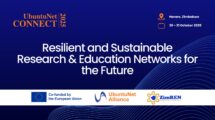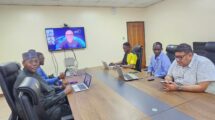Words: Effah Amponsah, WACREN
Momentum is building to enhance the visibility and impact of African public health research and researchers on the African and global stages. This movement, which is a testament to the significant potential of local research in informing policy development and addressing public health challenges, is a collaborative effort. WACREN, in partnership with PublicHealth.Africa (PHA), LIBSENSE, AFREhealth, the West African Institute of Public Health, and Peoples-Praxis are nurturing a sustainable open access (OA) public health research publishing ecosystem. We invite all stakeholders, including researchers, policymakers, and organisations, to contribute to this critical endeavour.
Initial research conducted in a PHA-LIBSENSE collaboration revealed the challenges African scientists face in publishing their research. These challenges, including high article processing charges (APCs), limited indexing of local journals in recognised global databases, and insufficient knowledge and capacity for open publishing, have created a visibility gap. This gap has led to the perception of a low-level contribution of Africans to the global public health knowledge economy, a perception that we are working hard to change.
The ‘Open Publishing for Public Health in Africa’ report on the follow-on workshop organised by the collaborators has more details, including feedback from participants across Africa. It provides carefully crafted recommendations, emphasising home-grown, needs-based policies, capacity building, and infrastructure to nurture and advance the open publishing of public health research locally and globally. This thorough approach instils confidence in the process and its potential outcomes.
WACREN, through the LIBSENSE initiative, has been a key player in advancing sustainable Open Access (OA) repository and journal development in Africa. Launched under the AfricaConnect2 project and further refined in AfricaConnect3, LIBSENSE addresses critical issues in the African scholarly communication landscape. Key initiatives include supporting countries with strategies and actions to promote open science principles and developing infrastructure, such as national and regional repositories and scholarly publishing platforms.
In a related collaborative effort, WACREN, EIFL, and AJOL have embarked on a new three-year project to promote no-fee Open Access (diamond OA) publishing in Africa. This project also focuses on developing shared open publishing infrastructures. The first of two calls for funding proposals was launched to support these goals in April 2024.
These initiatives signify a significant step forward in enhancing access to and disseminating African research, fostering a more inclusive and sustainable scholarly ecosystem on the continent.
The formation of a coalition on open access publishing on public health in Africa, a vital outcome of the recent workshop, lays the groundwork to play a pivotal role in driving an “Alumni Research Network”, another WACREN activity within the AfricaConnect3 project whose primary goal is to establish a robust network of capacity-building beneficiaries to assist in local data collection for WACREN and test new services. Additionally, the alumni network aims to develop and evaluate collaborative research programs and create an online educational course to showcase the methods and benefits of this collaborative approach.
These new concerted efforts to define a path for public health research visibility and leverage its potential for health policies welcome support from like-minded organisations and bodies interested in driving public health in Africa.





